Leo and Eric Johnson help manage cash flow and inventory by holding auctions and keep costs down by managing the majority of the sale themselves.

Moving used equipment and keeping inventory fresh is vital to the financial success of any dealership. However, it’s no secret that doing so can be easier said than done. For Johnson Tractor the solution is a dealer-run auction at its Juda, Wis., location.
The Case IH dealer has held an onsite auction 20 times over the last 25 years. Equipment for the auction comes from all three of Johnson Tractor’s stores — Rochelle, Ill., Janesville and Juda, Wis. Leo Johnson, Johnson Tractor principal, says they almost always have enough equipment for an auction each year. The most recent exception was 2010.
“We just plain didn’t have enough stuff to sell,” he says. “We kept the flow retailing so fast, but then by the time 2011 rolled around we were selling so much new we couldn’t keep up with the turns we wanted retailing, so we had a real big auction in 2011.”
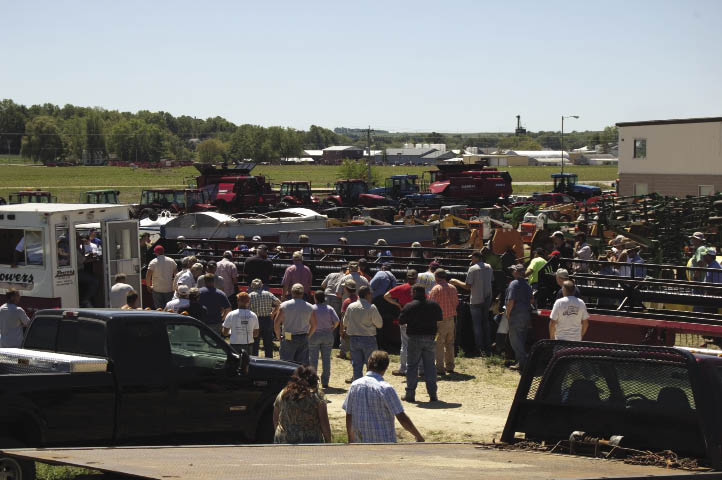
Johnson Tractor’s August auction at its Juda, Wis., location drew a crowd of about 350 people. The majority of buyers were from Wisconsin, Illinois and Iowa. However, a few pieces were sold to people from Ohio, Pennsylvania and Michigan.
For years the dealership held its auction on the Saturday after Thanksgiving — the day after the biggest shopping day of the year. “It’s kind of a weekend where a lot of people don’t make a lot of plans, so we did it on that date for a number of years. That generally worked out,” Johnson explains. “Then all of a sudden a few other dealers caught on to what we were doing and we started seeing multiple auctions in our area, not necessarily farm equipment dealers but auctioneers, they’d have their own consignment sales. So we decided to move our auction to the summer.”
Why run the auction yourself? For Johnson Tractor it’s because they’ve determined they are able to do it for nearly half the cost of what a normal auction company would charge in commissions, Johnson says. “The more important thing is, I know what works for me, and I’m meticulous enough that I kind of want to do things my way. This may be a character flaw on my part, so it’s not for everyone,” he says. “There are plenty of other dealers who would just as soon have somebody else manage it and spend their time doing other things, and that’s fine. But my particular interest is in managing this type of sale, so it works for us to do that.”
Johnson says they also pick the date based on their inventory. For example, their most recent auction — held on August 6 of this year — leaned heavily on combine heads. “Thanksgiving weekend wouldn’t be a great time to sell a bunch of combine heads,” he says. “With the inventory we had, we thought it would be better to have an August sale.”
Johnson warns, however, that there are some things you just can’t plan on. For example, when the dealership planned its auction back in the spring, there was little indication yet of what the summer had in store. “We had no idea we’d be in the worst drought in 50 years. But we’ll survive. It would be better if everyone had really good crops, but if the crops were good the [commodity] prices would probably be down,” he explains. “There’s a couple of different ways of looking at it. Maybe it’s a great time to have a sale having $8 corn and $16 beans. From the demand stand point, if there’s nothing to combine, folks don’t get real excited about buying harvesting equipment.”
Leading into the auction Johnson prepared himself for lower prices and budgeted a 15% loss on the inventory value as a result of the drought and the market. When all was said and done, Johnson Tractor ended up losing about 4% on the auction. “So the bad news is we lost money on our auction. The good news is it was about 11% better than what we budgeted for,” Johnson says.
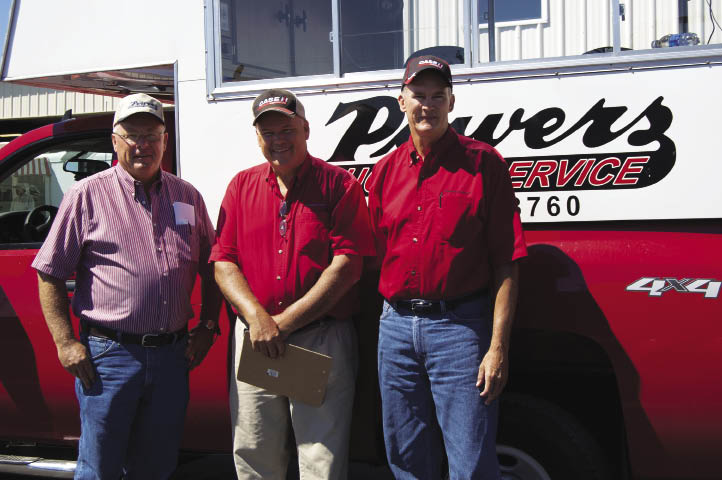
Johnson Tractor partners Leo (rt) and Eric (ctr) Johnson ran their most recent auction with the help of Powers Auction Service and auctioneer Dan Powers (left).
He adds: “We knew some of the things that we took in earlier in the year wouldn’t sell as well in a drought situation as they would have in a normal year, but, hey, that’s the hand we’re playing right now. So we play the cards we have and we’re just tickled to death that it was as good a sale as it ended up being.”
Planning and Marketing
Johnson says about one month before the auction he pulls together a semi-final list of the equipment that will be included in the sale, which is then used for the company’s bill of sale. Then, about two weeks before the auction, the final list is compiled and at that point the dealership stops selling anything off the lot that has been slated for the auction. “Really those two weeks before the auction is when the most powerful ads go out,” Johnson explains.
When it comes to marketing, Johnson Tractor usually takes out quarter or half page ads in major farm publications. “Generally, the majority of our buyers are from Wisconsin, Illinois or Iowa. That being said, we’ve stretched out to kind of a wider area and advertised a little heavier in more areas,” Johnson says. This year, he targeted more states than usual and bought ads in all the major farm publications in Wisconsin, Illinois, Minnesota, Iowa, Missouri, Indiana and a few in Ohio.
“It’s a big market these days and guys will go a long ways, especially if you’ve got some nice equipment. This year we had some really nice stuff in our sale, equipment that will draw buyers from a pretty good distance,” Johnson says.
In addition to marketing, the dealership also needs to get all the pieces to its Juda, Wis., location and cleaned up for the big day. “Getting all the equipment to the location is a big deal and takes a lot of work. When we get it there, we’ve got a couple of clean-up guys. One of them from our Janesville store is really fanatic on detail, so we send him there for about two weeks to detail the equipment. When that’s done and lined up, it’s looking really nice,” Johnson says.
Auction Day
Johnson prefers to keep his auctions under four hours, and when possible he really likes to keep it to three hours. The timing is based on the number of items and the dealership’s experience with auctions. “It takes more or less about a minute to sell a piece on average. So we try to have about 150-200 pieces,” he says.
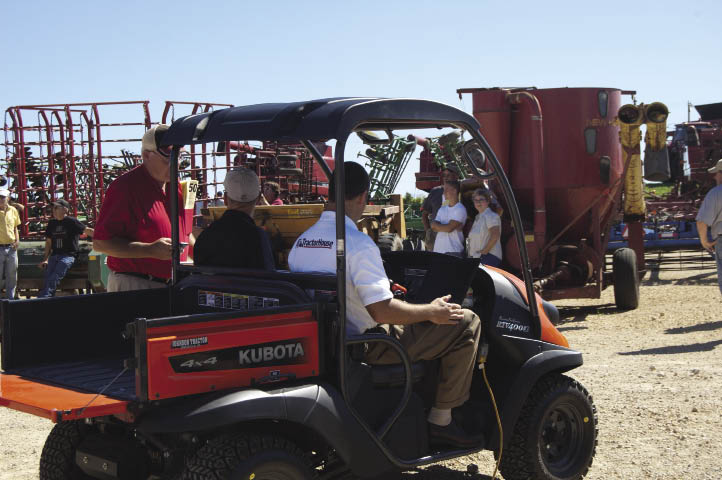
For the first time ever, Johnson Tractor included live Internet bidding at its auction in Juda, Wis., in August. The dealership worked with Tractor House to manage the online bidding.
Johnson Tractor starts its auctions at 10 a.m. — “right on the button at 10” to be specific. Johnson says they don’t have hours worth of small stuff. “We might have 10 or 15 minutes worth of scrap, stuff that sells for $1 or $10 or $50, but by 10:15 we’re into items that are $5,000 and up,” he says.
Limiting it to four hours means the auction can wrap up by 2 p.m., and buyers who came from a longer distance still are able to drive home that night. Johnson Tractor also helps keep the time down by limiting the number of local consignments they’ll take on, which Johnson says can tend to drag things out. “We find that after about 2 p.m. our main crowd starts to peter away,” he says.
The dealership gives the auction a retail feel. So while it doesn’t offer trucking and everything is bought “as is,” Johnson Tractor does offer financing. “We end up financing an awful lot of pieces, and that’s a good thing,” Johnson says. Financing is handled through CNH Capital.
Johnson says when they end up financing a lot of pieces it’s a good indication the equipment is going to retail customers and not used equipment dealers. And while he doesn’t mind selling to the used equipment dealers, he says “generally speaking, the equipment will bring more money when we have more farmers in there buying than when it goes to used equipment dealers.”
In addition, Johnson Tractor will also offer a reduced rate for trucking, especially if the dealership is able to truck the piece at its convenience. “So while it’s not truly a retail event, we’re trying to get as many end users as possible so in essence it is really retail,” Johnson says.
On auction day, the dealership works with an auction company to organize the event. This time around, Johnson worked with Powers Auction Service. He says they generally work with auction companies that offer a full-service auction, but only uses select services from them. The auction company provides the auctioneer and ring men, and Johnson says if the auction company has a preferred bookkeeping method, they will use it but otherwise they have a relatively simple in-house system they use.
But Johnson makes it clear the dealership only uses specific auction company services. “I direct the advertising, and we don’t have an auction company crew come in and line up stuff. My brother Eric and I do that ourselves. We basically manage the entire thing and the only thing we don’t do is auction itself and we don’t act as ring men. A lot of times, the auctioneer will bring in a clerk that they worked with before,” Johnson explains.
“I've been doing this a long time, so if a belt looks worn to me, I'll tell them the belt's worn out ...”
— Leo Johnson
Over the years Johnson Tractor has worked with about five different auction companies, and Johnson says they rotate who they use based around the caliber of the equipment they’ve got up for auction and the area in which they are selling. “For example, the company that I’m using at our Juda sale is about 20 miles away from Juda and he not only does dealer auctions but he’s known pretty well in the farm community, so he’s right for that one,” Johnson says. The last auction held at Johnson’s Rochelle, Ill., facility, five years ago, had several pieces in the $100,000 range. “For that one, we brought in Ted Everett from Indiana who is perceived to be a high caliber auctioneer. He comes from a larger area, and sure enough some of the buyers there were from Tennessee and Kentucky and even one from Texas who flew in. The sale attracted some high-powered used equipment buyers. So who we work with depends on what we’re selling.”
Johnson says when he has an auction with smaller and older equipment that bring in less dollars, he’ll usually call in a local farm auctioneer because those sales usually draw a more local customer base. “Generally, it will be a more local market and they aren’t going to get buyers from five states away to drive or fly in to buy $5,000 and $10,000 pieces. So you might as well stay with a more local guy for those smaller sales. That works for us,” he says.
Remote Bidding
Johnson says they typically get a number of phone-in bids. While they’re more than happy to work with out-of-town bidders, both the buyer and the dealership need a certain level of comfort with each other for it to work. “What we do there is we prescreen them. We insist that they do a credit application and, if they buy a piece, we know the buyer’s for real,” Johnson explains.
“Last year we sold a tractor to someone in Colorado via phone bid. He was on the phone during the auction. As long as we are comfortable that the customer will pay us, we don’t mind doing that. The customer obviously had a comfort level with us. I followed up with him a couple of weeks after he made his purchase and had arranged delivery on his tractor. He was tickled to death by what he bought.”
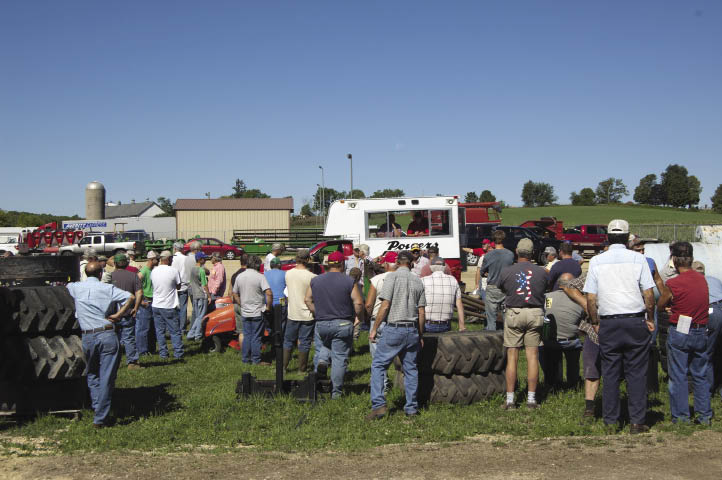
Johnson Tractor organizes its auctions to start with small miscellaneous pieces, such as wheels and tires, anhydrous tanks and axles. “We don’t have an hour’s worth of small stuff. We might have 10 or 15 minutes worth of things that sells for $1, $10 or $50, but by 10:15 we’re into $5,000 items and up,” Leo Johnson, Johnson Tractor partner, says.
To help achieve that comfort level, Leo or Eric Johnson will spend five or 10 minutes on the phone with a potential buyer a couple days before the auction walking through and discussing the piece of equipment that interests the caller. The Johnsons point out every nut and bolt they see and every wear point to help convince the caller that “my eyes are their eyes,” Johnson says.
Johnson adds, “I’ve been doing this a long time, so if a belt looks worn to me, I’ll tell them the belt’s worn out. If the paint job is really nice and shiny, I’ll tell him ‘Hey, the paint is really nice and shiny.’ I don’t try to over sell anything. I describe it the way I see it. I found that if they spend a little bit of time with me a day or two before the sale on the phone, they’ll bid a little bit higher then when it’s actually time for the auction.”
While the Johnsons will spend time on the phone with buyers leading up to the auction, they don’t personally handle the call-in bids on auction day. On the day of the sale, the dealer will have staff members on hand to call any interested phone bidders when the piece they’re interested in is up for bid. They then hand off the phone to one of the auction company’s ring men.
This past August, Johnson Tractor took its auction online for the first time, allowing buyers to bid via the Internet during the live auction. “This was our first experience with Internet bidding, and like anything, the first time you try something you learn a lot and this service will get better,” says Johnson.
The auction received a lot of Internet inquiries and they did get a substantial number of bids, Johnson says. “The actual number of pieces sold on the Internet was probably less than 5%, but those 5% are all good buyers too and we see this growing. Like the auctioneer says, ‘It doesn’t matter how much they buy, it’s how much they bid.’ By generating more bids from around the country, whether the Internet customer ends up being the final bid or a someone standing right in front of the truck is the one who ends up with it, the more bids the higher the prices go, and that’s what it’s all about for us,” he says.
The Internet bidding process is definitely slower than what is happening live at the truck, but Johnson says speeding up that process is something they look forward to in the future. What slows it down is the person at the dealership operating the Internet auction because he needs to type in the current bid and hit enter. Then the buyers will spend a minute thinking about it, type in their bid and hit enter. While that doesn’t sound like an arduous process, it does take up more time than the fast-paced process at the live auction.
“So, it takes a good operator in the truck because if the bid on the ground is $2,000, the guy in the truck has to enter in $2,000 so that the people at home know what the current bid is. It takes a real savvy person to do that and the gentleman we had actually worked for Tractor House and he was doing that. He did as a good of a job as he could, but it was his first auction he’d done too. There’s a learning curve for everyone on this and we expect as we move forward that it will get better,” Johnson says.
While big auction houses have been incorporating live online bidding into their auctions for years, Johnson says their software programs are probably much more sophisticated than his. “But as long as we keep doing our own auctions, which we will do, we’ll get on board with this. As the technology improves and is more available to people like us, we don’t want to have to reinvent the wheel. We just want to use the best technology available to us,” he says.
Lessons Learned
Johnson says there are a few different theories on what and how much to have in your auction. For example, if you have two tractors that are more or less the same, they will sell fairly well, he says. If you have four of them, some people will suggest the four tractors will draw that much larger of a crowd because there are four rather than just two. However, Johnson has found that is not the case for his dealership. “Our experience is the third and fourth one tend to fall off in price, and so having too many of the same thing hurts. We’ve found that having a wide variety for us seems to work well. If we can mix up our models and years and give a nice variety that works.”
Being in the retail business as well as holding auctions means the dealer must be smart about when he stops making retail sales, Johnson says. While it’s hard to tell salesmen they can’t sell something because its going to auction, he says they’ve found that it’s very valuable to their auction to have some high quality pieces. In addition, Johnson Tractor has learned that all sales must be absolute, and they don’t have any reserve bids. “By the same token, we allow some consignments to come in, but we don’t let anybody who consigns equipment bid it back and we explain that up front. We don’t want equipment there where an owner might think it’s worth way more than the market will bear,” Johnson explains.
He says the obvious benefit to holding their own auction is cash flow, turning used equipment into cash. “You can’t pay your utility bill with used tractors,” he says.
If cash flow is the number one reason, then the number two reason is to keep a fresh inventory. “For us, it’s important to clean house once in awhile and whether it’s cleaning house by sweeping the showroom floor once a year for an open house or whatever, for us purging our inventory, getting it cleared out and starting fresh with a whole new slate, gives us a sense of rebirth and we can start fresh and start selling more new equipment and take in trades again.”
“I think that for a dealer to get excited about having an auction, it takes a lot of preparation, it takes a lot of work, there’s a certain amount of risk involved, but heck there’s risk every day in everything we do. The more prepared you are for it, the higher probability you’ll take most of that risk out,” Johnson says.


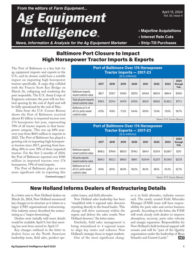
![[Technology Corner] Pessl Instruments CEO Talks Dealer Benefits From Lindsay Corp. Investment](https://www.agequipmentintelligence.com/ext/resources/2024/04/25/Pessl-Instruments-CEO-Talks-Dealer-Benefits-From-Lindsay-Corp.-Investment.png?height=290&t=1714144307&width=400)
Post a comment
Report Abusive Comment